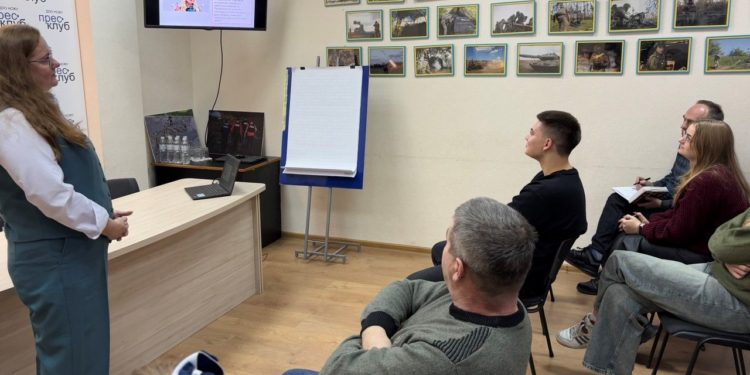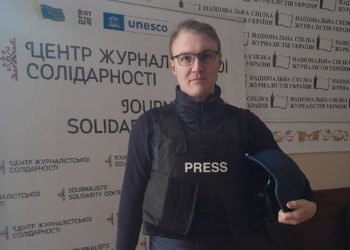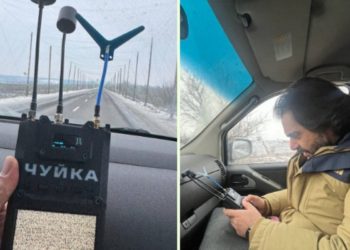What is information hygiene, how to check the news, and how to recognize fake news – this was discussed at the training on countering disinformation, which took place at the Dnipro Journalists’ Solidarity Center of the National Union of Journalists of Ukraine (NUJU). Maryna Boiko, a coach from the HOLOS PRO non-governmental organization, helped to understand these and other issues.
In the context of the rapid development of information technologies, the problem of the spread of fake news and disinformation is becoming increasingly acute, as a result of which the concepts of information hygiene and media literacy are gaining importance.
According to the USAID-Internews survey, 57% of respondents do not perceive disinformation as an urgent problem. Although the majority believe that they can distinguish true information from fake news, only 8% of respondents were able to distinguish truth from lies. Disinformation is a phenomenon that constantly changes its form, but most importantly, it always puts pressure on emotions. That is why people are influenced by it.
Disinformation in Ukraine is becoming especially dangerous. Therefore, it is necessary to defend not only physical borders but also the information front. Fakes are actively spreading in social networks and messengers, where they quickly become viral. The media is not immune to the problem because even messages published in white-listed media should be treated critically.
Information hygiene is a system of knowledge and skills that is an important protective tool that helps reduce the negative impact of information on the well-being of an individual, their psychological and physical health, and society as a whole. It involves the ability to critically perceive and analyze information sources, recognize fakes, limit content consumption, etc., and requires regular training, practice, and improvement. After all, only in this way can you help transform this tool into a useful habit, important for many reasons. Therefore, such training sessions, according to Oleksii Kovalchuk, the founder of the media outlet, Visti Prydniproviya, are currently relevant.
Among the participants of the training were also higher education graduates majoring in Journalism from higher educational institutions in Dnipro. Students actively participated in the discussion, shared their own experiences, and gained practical knowledge and skills in media literacy.
The need to teach students such skills was also emphasized by Nataliya Larionova, a displaced journalist from the Donetsk Region who currently lives in Dnipro. Despite the fact that the topic of the event was not new to the media worker due to her extensive work experience, she noted that high standards should guide those who are just entering the profession.
How to identify a fake: Expert’s Advice
Pay attention to the headline. Ask yourself if the headline corresponds to the content? How does it present a quote or fact? Does it press on emotions? Is it manipulative in nature? If the headline does not match the text of the news, is too emotional and provocative, or contains out-of-context and/or distorted quotes, facts, etc. – be careful; the news may be fake.
Check the publication date. Fake news may be based on real events that happened in the past.
Read the content, the quality of its writing, emotional coloring, and unreliable photos/videos. Fake news may contain many grammatical and spelling errors, excessive emotionality, appeal to superstitions, conspiracy theories, subjective assessments and opinions presented as facts, etc.
Check the reliability of the sources of information. If the source is anonymous, unknown, suspicious, without indicating the institution, or absent altogether – the news may be fake. Look for the source.
See if the news is available on official sources, in other media, etc. Use the rule of three independent sources (official websites, experts, and international sources).
Look for visual confirmation that the image or video is authentic. To verify the photo, use resources such as Google Images, Tineye, and Fotoforensics.
Monitor fact-checking projects (e.g., Center for Countering Disinformation, Center for Strategic Communications and Information Security, StopFake, NoLies, NotaYenota, VoxCheck, etc.).
Trust, but verify: develop critical thinking.
Call the Dnipro JSC by dialing 050 919 8479 (JSC coordinator Nataliya Nazarova). The Center’s address is 8 Starokozatska Street.
ABOUT JSC
The Journalists’ Solidarity Centers is an initiative of the NUJU implemented with the support of the International and European Federations of Journalists and UNESCO. The initiative is designated to help media representatives working in Ukraine during the war. The Centers operate in Kyiv, Lviv, Ivano-Frankivsk, Chernivtsi, Zaporizhzhia, and Dnipro and provide journalists with organizational, technical, legal, psychological, and other types of assistance.
ABOUT UNESCO
UNESCO is the United Nations Educational, Scientific, and Cultural Organization. It contributes to peace and security by promoting international cooperation in education, sciences, culture, communication, and information. UNESCO promotes knowledge sharing and the free flow of ideas to accelerate mutual understanding. It is the coordinator of the UN Action Plan on the Safety of Journalists and the Issue of Impunity, which aims to create a free and safe environment for journalists and media workers, thus strengthening peace, democracy, and sustainable development worldwide. UNESCO is working closely with its partner organizations in Ukraine to provide support to journalists on the ground.
The designations employed and the presentation of material throughout this digest do not imply the expression of any opinion whatsoever on the part of UNESCO concerning the legal status of any country, territory, city, or area or its authorities or concerning the delimitation of its frontiers or boundaries.
The authors are responsible for the choice and the presentation of the facts contained in this digest and for the opinions expressed therein, which are not necessarily those of UNESCO and do not commit to the organization.
Dnipro JSC information service

 THE NATIONAL UNION OF
JOURNALISTS OF UKRAINE
THE NATIONAL UNION OF
JOURNALISTS OF UKRAINE
















Discussion about this post